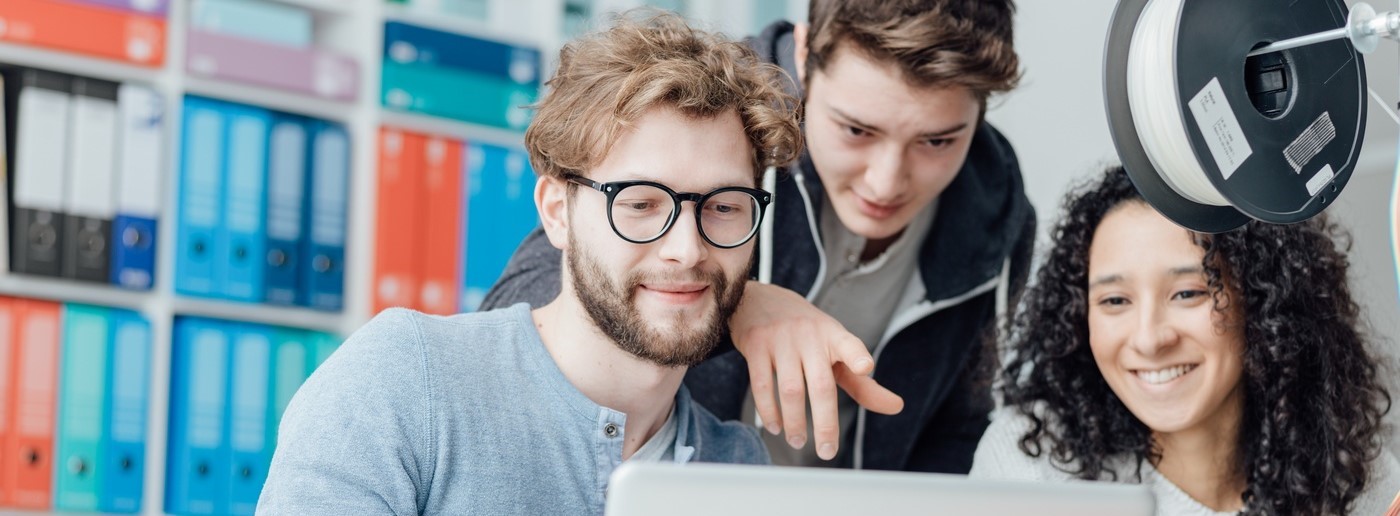

HNBK »
After the Easter holidays, the HNBK welcomed nine students and four teachers from the Norwegian partner school Rud videregående skole near Oslo as guests in Essen. They took part in an exciting two-week exchange project at the HNBK as part of the European Erasmus+ funding programme.
During the first week at HNBK, the 17 to 22 year old Norwegian students learnt the basics of the KNX bus system in a course taught by Mr Kaiser and Mr Powierski. They programmed and wired modern home control systems and could then put them into operation.
In addition, the Norwegian visitors also gained interesting insights into other lessons at the HNBK. In Mr Mühlenhoff’s and Mrs Meyer’s classes they participated in English lessons, in Mr Fehlen’s class they learnt about network technology and in Mr Mehl’s computer science class they learnt about the programming language C++.
An Industry 4.0 project was the focus of the exchange in the second week. First, the exchange students learnt to program small autonomous logistics robots, Robotinos from Festo. Then they came together for a two-day workshop with the students from class SI-21A.
Under the guidance of Mr Weber and Mr Lehmann, they competed against each other in international teams of four. The task was to construct so-called rovers, small autonomous vehicles similar to NASA’s Mars rover. The aim of the project was to control the self-built rovers via a web app from a smartphone, to have them brake independently in front of walls, to record a camera image and then send it to the smartphone. At the end of the workshop, the rovers competed against each other and the most successful team was crowned the winner.
Cultural sightseeing was also part of the programme.
On the second afternoon of their stay, the Norwegian group, led by Mrs Lotfi, took a historical walk to Villa Hügel, the former residence of the industrialist family Krupp. The villa, jokingly referred to as the Buckingham Palace of Essen, celebrates its 150th anniversary this year.
Of course, an excursion to the world cultural heritage site in Essen, the Zollverein Coal Mine Industrial Complex, was not to be missed. The trip took place together with the SI-21A class in beautiful sunshine on the penultimate day of the exchange. Mixed in two guided tours, in German and in English, the pupils followed the way of coal mining at the colliery in the still preserved surface facilities of shaft XII.
ZTo round off the day, the group stepped onto the panoramic roof of the coal washing plant, which offers a view of the Ruhr skyline from a height of 45 metres and makes you marvel at how green the former industrial region has become.
What is particularly exciting about Erasmus+ is that not only students but also teachers have the opportunity to exchange ideas internationally. They work in European teams and organise the exchange of pupils, but also have the chance to develop and implement pedagogical concepts together.
In European teamwork, the pupils master programing tasks in a short time, are motivated by their joint successes, but also learn to deal with setbacks. The working language for the project participants is English, which is an additional benefit for all sides. And so, when saying goodbye to the Norwegian guests, everyone agreed that the exchange not only provided new technical knowledge and its quick practical implementation, but has also broadened the participants‘ horizons overall. Everyone is looking forward to further cooperation and a return visit to Norway.
Text: LOT, DIX, WBR. Photos: DIX, Norwegian colleagues and as indicated.